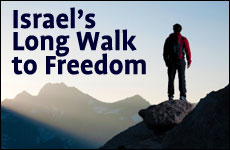 Iran’s Attack on Israel
Iran’s Attack on Israel


5 min read
Committing to life as a journey of victories and defeats goes to the heart of creation.
Election season is disconcerting for society. In pursuit of votes, competing politicians highlight the country’s failures as they lay claim to the remedies for all the social ills. At such times, we need to step back and consider the broader reality. In Israel’s case, this includes both the great victories and remarkable accomplishments achieved since its establishment, as well as the serious flaws and shortcomings that need to be confronted with unwavering honesty. We need to avoid the twin extremes of despondency and complacency.
In his autobiography “Long Walk to Freedom,” South African President Nelson Mandela, considers the balance needed when reflecting on the past and the future, on achievements and failures: “I have walked that long road to freedom. I have tried not to falter; I have made missteps along the way. But I have discovered the secret that after climbing a great hill, one only finds that there are many more hills to climb. I have taken a moment here to rest, to steal a view of the glorious vista that surrounds me, to look back on the distance I have come. But I can only rest for a moment, for with freedom comes responsibilities, and I dare not linger, for my long walk is not ended.” At this momentous time of elections for a new Knesset, we can take “a moment to rest” to consider “the glorious vista” and to “look back on the distance” that the people and State of Israel have travelled, and to realise that “there are many more hills to climb.”
Understanding the imperfections of the human condition and committing to life as a journey of victories and defeats goes to the heart of creation. Angels, says the Talmud, are “the standing” ones, and human beings “the walking” ones. Static and standing still in absolute perfection, angels are flawless spiritual beings who do not have free choice; they inhabit the pure, pristine heavenly worlds in which there is no suffering or injustice. Angels can do no wrong, but therefore can do no right, because they are frozen in an eternal, unchanging status quo with no freedom to make real moral choices. We, “the walking” ones, freely choose between good and evil but live in a turbulent, earthly world, filled with so much joy and wonder and, yet, at the same time, so much pain and suffering.
Stumbling and falling is part of the journey.
We have the God-given powers to change and improve, as well as to sin and stumble, and thus live dynamically with victories and defeats, regressions and progressions. Stumbling and even falling is part of the journey. Every worthwhile life endeavour is fraught with challenges and obstacles. “For the righteous one falls seven times and arises”, says the Book of Proverbs (24:16). Rav Yitzchak Hutner (1906-1980) explains the verse to mean that the righteous do not arise despite falling, but rather through falling and overcoming defeat, they become great. Provided we strive to move forward on our journey every misstep becomes part of achieving our Divine purpose on earth.
Israel is a “walking” country. Born amidst awesome miracles in the shadow of the Holocaust Israel has, with God’s abundant blessings, secured extraordinary economic, military, educational and societal victories. Yet tragically, after all these years there are still awful threats to Israel’s safety and political legitimacy. Our ‘long walk to freedom’ continues each year. As we take new steps – some small and some large, some forwards and some backwards – we do not move towards a fixed destination, but rather progress along a dynamic ever-evolving journey. We have not arrived because in this earthly world one never arrives. Human beings are “the walking” ones, and we are placed by God in this physical universe to go on a dynamic, ever-evolving journey of spiritual and moral growth, of national and personal development.
This philosophy goes to the heart of every aspect of our lives in this earthly world. Creating loving and strong families is also a “walking” journey. Marriage is not an endpoint of the unchanging, perfect bliss of the wedding day. It is a “walking” relationship - changing, developing and deepening. In great marriages, husband and wife invest constant energy, passion, and thought to nurture and grow the love between them. They realise that on that journey they will make mistakes and stumble, but they are committed to marching forward and becoming stronger and more loving as the years pass. Parenting is also not a destination but rather a “walking” dynamic enterprise, as children are raised, educated and given the moral, spiritual, emotional and physical tools for life. It is a calling that never ends, and requires commitment and dedication through all its stages.
This philosophy of “walking” through life guides everything that we do, which would explain why Jewish law is called “Halacha,” from the root to walk. The Halacha is our guide to living an inspired dynamic existence; to living in such a way that all areas of our lives are in sync with God’s will, thereby refining, nurturing and allowing us to become people of all-round greatness. Earning a living as a conscientious employee or building a great business is a journey of effort and integrity, of hard work and ethics. Doing good deeds is a journey of compassion and care, of sensitivity and kindness.
Spirituality is a journey of connecting to God through prayer and good deeds in a forceful way, in which our faith and devotion deepens all the time. Happiness and emotional well-being are not elusive destinations that we seek to arrive at but, rather, evolving processes of living with meaning and self-knowledge, of giving to others and self-transcendence. In all our national and personal journeys the most important thing is to keep “walking” to fulfil our Divine purpose on earth.
